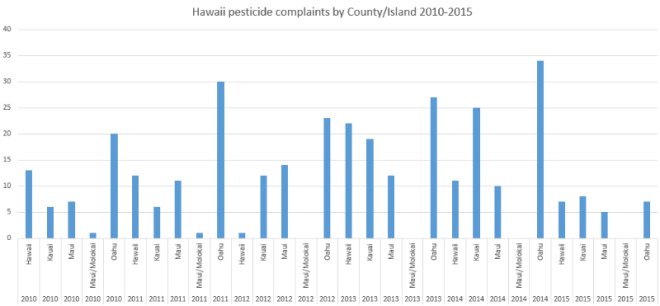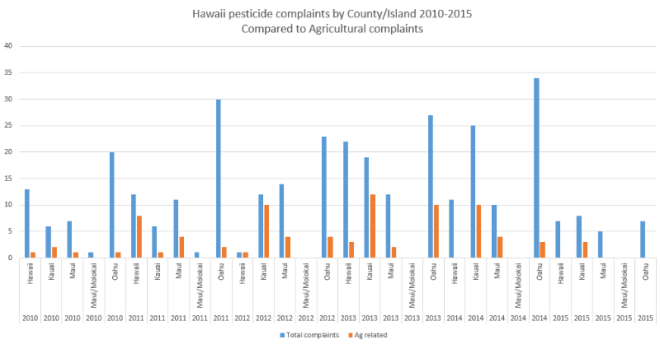The Truth About Pesticides in Paradise
by Joni Kamiya, Hawaii Farmer’s Daughter, December 21, 2015
I want to know the truth about the issue of the pesticide complaints in Hawaii so I decided to review the raw data myself to see. I made a request in the interest of public information to the Hawaii Department of Agriculture. I looked for complaints across the state in zip codes where many of the farms targeted are located from 2010 to 2015 to see what the truth really is.
So what did I find? I found a total of 365 complaints made. If you listened to the Center for Food Safety, you’d think all of them are agriculture related. It turns out that there were 91 out of that 365 being agriculture related. A total of 38 came from Kauai alone. And that number doesn’t equate to any violations either.

Pesticide complaints by island. Note that after 2011 on Maui county there were no complaints made.
So is agriculture the sole source of the pesticide complaints? Let’s see what the data says comparing total complaints to agriculture.

As you can see, the agricultural sector only makes up a small number of the complaints compared to other uses. These complaints don’t always mean there’s a true issue either. And if so, are we really addressing the real problem?

If you look at the data, the homeowners are the biggest violators of pesticide usage. So where should our efforts be targeted if this is an issue? What does the evidence say? The data points to the urban users. (PCO refers to Pest Company Operators.)
It’s of no surprise that Kauai County Council Member, Gary Hooser, just published his op-ed on the Good Neighbor Program being faulty and trying to point his fingers at a certain pesticide, chlorpyrifos. He does fail to mention that homeowners used to be able to purchase this effective crop protection product prior to it becoming restricted in 2001. There’s also evidence that some residues do remain in the home but again, it doesn’t mean it’s at a level to be concerned about. So while Hooser tells people that the residues found in homes are from farms, there’s a high likelihood it could be other sources that he fails to mention to them. It’s still used in agriculture for citrus, almonds, and other crops that he also fails to mention. It’s also the prime target of of Earthjustice’s litigation to have the EPA ban it. So Gary tells the Kauai folks that farms are to blame for this pesticide but fails to tell the entire story to them making them repeat things that can easily be challenged.

Gary is right in some aspect that we should have a good neighbor program and it means starting with your own neighbors learning how to use those pesticides properly through education. He conveniently ignores this and goes on to target the farms once again to fan more fears in the community. He makes no statement of the real problem as he’s counting on the masses to just believe his word and not seek the truth. Don’t be caught making an unfounded statement and have it called out.

The community getting hit by this is the North Shore of Oahu, where agriculture is still a big component of the landscape there. I learned that even a principal of an elementary school there was accused of poisoning kids by a parent who resorted to yelling at him in front of kids. There’s something wrong when parents are so fear mongered that they can’t even keep their behaviors in check around kids at a school. What kind of example does this set for these kids? This person continues to video farms and make accusations of him being sprayed and yet he stands there nearly a football field away stating that. If you were so scared of being poisoned, why stay and why even stand there videoing all of this? Why even move there to begin with?
I’ve also learned from farmers that they still get complaints of pesticide spraying that are unfounded. When working outside, some people think that any spray is a pesticide and have called the police on those farmers, especially those who live in ag land between homes. They get to have a friendly visit from a policeman of the complaint. How much time and effort is wasted by these kinds of baseless complaints? It’s really taking a toll on many long time farmers who used to be well respected in the community but now face allegations because of the likes of Ashley Lukens and her organic industry funded, Center for Food Safety. Her group also is essentially a lot of work for the Department of Agriculture and Department of Health that really misdirecting their efforts away from real issues in the community. (Her effort should really go after “food safety” issues as their name implies, specifically with Chipotle and all the new food truck vendors popping up on the North Shore of Oahu. If we want to protect keiki, we’d also better take a look at the real chemicals endangering them like the rising drug use in rural communities.)
The new year is right around the corner and I’m hoping that the data will be loud and clear to our legislators and other politicians. The public deserves wise use of our resources and not have burned away by outside activists trying to divide communities and disinform people. It cost families’ relationships on Kauai, Molokai, and Maui. It cost taxpayers tens of thousands of dollars to have hearings that were chockful of mantras from unvetted websites and psuedoscientists like Jeffrey Smith. All of this time and money could’ve been used to get someone off of drugs, take care an isolated kupuna, or give a kid a meaningful recreation program.
There are so many people in need in our communities and so many REAL problems that need addressing. Just look around and it’s clear where our resources need to go. We, the public, deserve better management of our community pot. It’s time for our LEADERS to lead with evidence based policies and not whims of conspiracies lingering from the last 3 years. The farmers have to farm and we want to. We are tired of defending our work and have to focus on growing Hawaii.
Come learn from a farmer and see it for yourself the truth. Let’s make it a better new year and heal the divide in our communities. Our keiki deserve that for their future. We have to lead and encourage learning for them and end the attitude of A’ole everything. That’s the real investment we need to start with and it begins NOW!